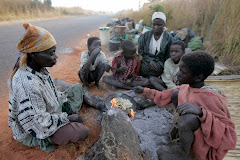Elections 2008: An Engendered Perspective
Among the key obligations attached to the enjoyment of freedom of expression are those relating to pluralism and gender sensitivity in media coverage.
Concerning the ethos of Gender equality, there is a worrying trend around the lop-sided manner in which the media is conducting itself in the run-up to the March 29 2008 elections. If what we are reading, hearing and seeing in newspapers, radio and television is anything to go by, then the women’s stake in this election has been reduced to that of second class citizens who exist to cheer and thrust men into positions of political power.
As the contestants in the March 29 polls intensify their campaigns, the media has relegated the voices of women to the periphery. For instance, The Financial Gazette issue of 14 - 20 February 2008 contains a story in which a male parliamentary candidate invaded a constituency that had been earmarked for a female candidate under the ZANU-PF quota system .There is not much insight and outcry in the story or other media as to the implications of this patriarchal invasion into women’s territory.
Pertaining to the “quota system”, it is notable that there have been a number of stories in The Herald, The Sunday Mail, The Standard, The Financial Gazette and The Zimbabwe Broadcasting Corporation television and other media. The extensive coverage pertaining to women participation in politics is welcome.However; there is need for the media to go deeper in analysing the qualitative aspects around the implementation of the quota system. For example, there is need to interrogate the idea that female candidates being fielded by the MDC and ZANU-PF have been made to contest in risky constituencies while men have allocated safe seats to themselves.
It is also necessary for the media to critically examine whether the prolonged stay in parliament by parliamentarians such as Ms Shuvai Mahofa for instance is aiding the ‘”cause of women empowerment” or otherwise.
Another issue that begs media scrutiny pertains to former Finance Minister Dr Simba Makoni’s presidential bid. Media coverage has largely been confined to the campaign activities by Dr Makoni and his male colleagues to the exclusion of women members in his team. Yet we gather from The Standard edition of 2 - 8 March 2008 that some women are also actively involved in the Makoni presidential campaign project. Surely the electorate has a right to know much more about the likes of Ruth Chitukurudzi, Anastacia Moyo, and Dorothy Mbengo beyond being simply presented in an advert as independent candidates in his camp.
Furthermore if much media space and time is being devoted to known male figures such as Zanu PF politburo member Dumiso Dabengwa who has publicly stated his support for Makoni, is it not also necessary that attention be paid to equally known female figures such as Margaret Dongo, Fay Chung and Rudo Gaidzanwa.
In similar vein why should “prominent” women politicians such as Vice-President Joyce Mujuru dominate the country’s airwaves while the rest are relegated and mentioned in passing only. Again, why is it that most media stories on the pending election are being dominated by male commentators?
These issues and questions point to glaring inequalities in the manner the Zimbabwean media has so far covered issues pertaining to the March 2008 elections. This therefore poses as a serious indictment not only for the media but for citizens and women in particular to demand equal and equitable media coverage as the elections campaigns intensify.
This commentary appeared in The Standard 9 -15 March, 2008
Thursday, March 20, 2008
Subscribe to:
Post Comments (Atom)



No comments:
Post a Comment